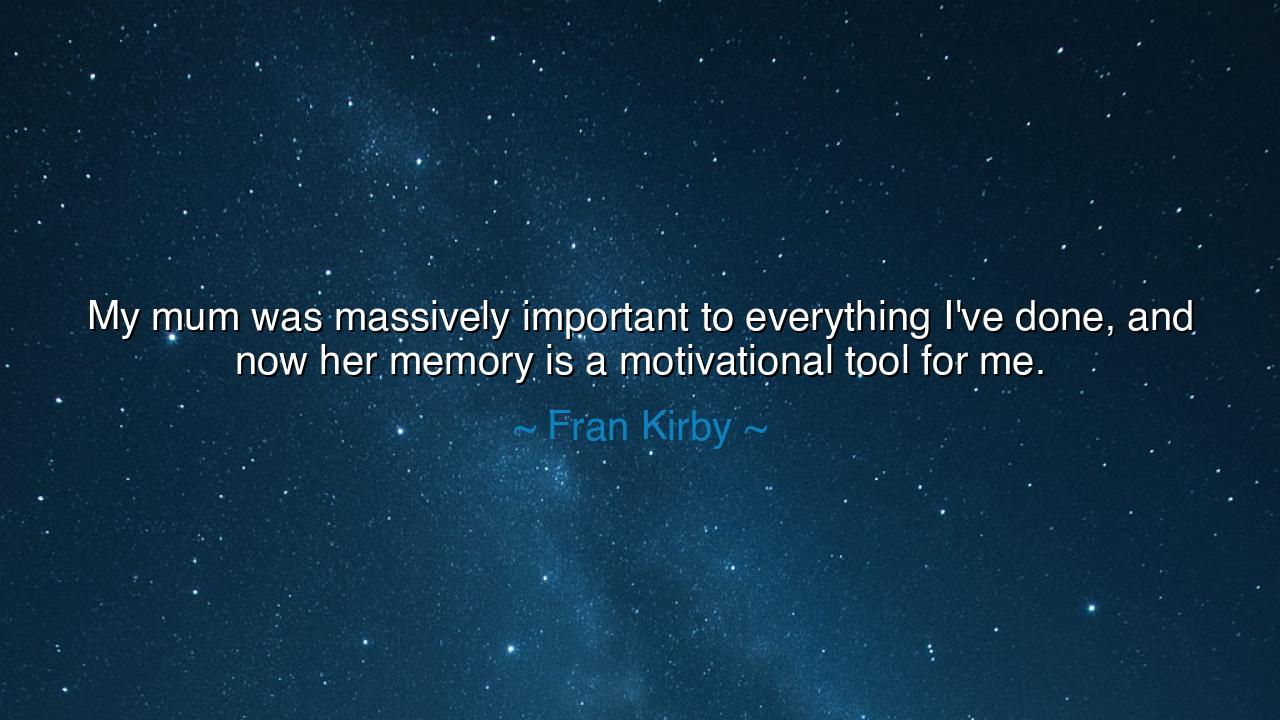
My mum was massively important to everything I've done, and now
My mum was massively important to everything I've done, and now her memory is a motivational tool for me.






In the words of Fran Kirby, the great footballer who has walked through triumph and through sorrow, we hear a cry that is both personal and universal: “My mum was massively important to everything I've done, and now her memory is a motivational tool for me.” This is no simple reflection; it is a truth etched into the hearts of all who have loved and lost. It tells us that even when the body departs, the memory endures—not as a shadow of what once was, but as a living flame that guides the spirit forward. The ancients knew this well: to remember the dead was not only to honor them, but to harness their presence as a source of strength.
When Kirby speaks of her mum, she calls forth the eternal bond between parent and child, a bond that even death cannot sever. The ancients would compare it to the roots of a mighty tree: hidden beneath the earth, unseen, yet nourishing every leaf and branch above. Her mother’s importance is not merely in past deeds, not only in childhood care and nurturing, but in the silent strength that now carries Kirby through the battles of her own journey. Thus, memory is not a chain that binds; it is a wind that pushes the sail toward destiny.
Consider the story of Alexander the Great, who, after the death of his father Philip, carried not only the crown but the memory of his father’s vision. Though Philip had united Greece, it was Alexander who carried that dream beyond the horizon, into Asia, into lands unimagined. His father’s memory became his compass, his fire, his unspoken command to continue what was begun. Just as Kirby transforms her mother’s memory into a motivational tool, Alexander turned grief into empire. The lesson is eternal: what we lose in flesh, we may gain in spirit, if only we dare to carry memory as fuel rather than as a weight.
Yet let us not pretend that such a path is easy. To lose a loved one is to stand before the abyss, staring into darkness that tempts us to despair. Many falter, many are broken, many allow grief to close the door of their heart. But there are others—heroes of soul—who transform sorrow into a sacred fire. Fran Kirby is among these, for she did not let her grief consume her; she let it guide her. To use memory as a weapon of hope is no small feat—it is the alchemy of the heart, turning pain into power, turning absence into inspiration.
There is, too, an ancient echo of this truth in the words of the poet Virgil, who wrote of Aeneas carrying his father Anchises upon his shoulders out of burning Troy. Anchises would soon die, but his memory became Aeneas’s anchor as he sailed to found a new city, a new destiny—Rome itself. So it is with Kirby: her mother’s presence may have been taken from the world, but her spirit lives on, urging her daughter toward greatness. In this way, memory becomes legacy, and legacy becomes action.
The meaning of Kirby’s words is clear: love does not end, it transforms. The voices of those we cherish become whispers in our hearts, urging us forward when we would falter. Their memory is not a chain binding us to sorrow but a torch lighting the path of resilience. To remember rightly is to honor the departed not with tears alone, but with deeds worthy of their name.
Therefore, let this be the teaching passed to you: do not let the memory of your beloved ones rest idly in your heart. Carry it as a banner. Let their sacrifice, their love, their faith in you be the iron in your will. Write their names in your actions, speak their lessons in your choices, and let every victory you earn be shared with them in spirit.
And so, the practical counsel is this: when grief strikes, sit not forever in silence. Rise, take one step forward, and dedicate that step to the one you lost. Each act of courage, each moment of endurance, each triumph however small, becomes a song of remembrance. In this way, you, too, will turn sorrow into strength, as Fran Kirby has done. For the greatest honor we can give the dead is not our tears, but our lives well-lived.






AAdministratorAdministrator
Welcome, honored guests. Please leave a comment, we will respond soon